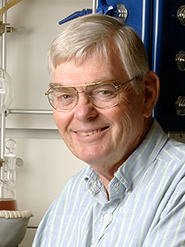
Robin Kinnel, the Silas D. Childs Professor of Chemistry emeritus and lecturer in chemistry, was the co-author of an article published on July 24 in the Journal of Natural Products.
“Combining Mass Spectrometric Metabolic Profiling with Genomic Analysis: A Powerful Approach for Discovering Natural Products from Cyanobacteria” describes how knowledge of a cyanobacterial genome used in combination with sophisticated mass spectrometric analysis can help to predict the presence of unusual natural substances that might have potential biological activity.
Lead author Karin Kliegrewe of the University of California San Diego carried out the genomic analysis and mass spectrometric profiling, which led to the prediction of an unusual fatty acid amide present in the cyanobacterium, Moorea bouillonii.
Kinnel was responsible for the isolation and structure proof of the compounds, called columbamides for the original geographic source of the cyanobacterium, Pigeon Island, Papua New Guinea. “Columbidae” is the family name for pigeons and doves.
According to Kinnel, the columbamides are of bioligical interest because they show cannabomimetic properties – that is, they potently bind to two different cannabinoid receptors, mimicking anandamide, a naturally occurring compound that has effects similar to THC.
According to Kinnel, predicting the presence of unusual secondary metabolites and being able to make rough predictions of their structures from the genome allows scientists to hone in rapidly on compounds with potential activity against a variety of devastating diseases, based on similarity to known active agents. It also allows them to perform more specific assays to look for a useful activity, which can lead to a clinically useful drug. Since more than 60 percent of drugs currently in use are either natural substances themselves or those that have been structurally modified to enhance their clinical usefulness, perhaps by increasing the potency or diminishing unwanted side effects, exploration of the metabolic products of a wide variety of organisms is a tried and true pathway for developing enhanced therapies for disease.
The Journal of Natural Products is a publication of the American Chemical Society and the American Society of Pharmacognosy.
